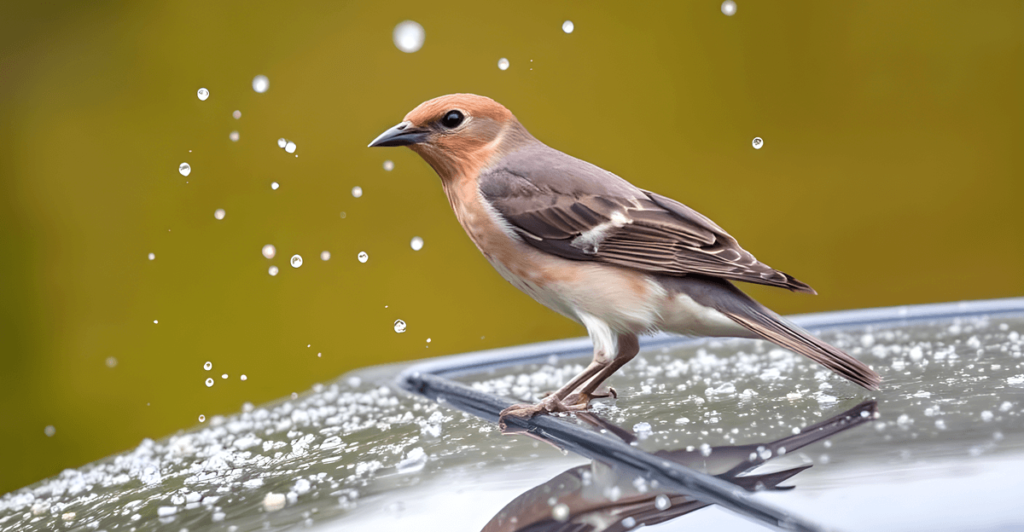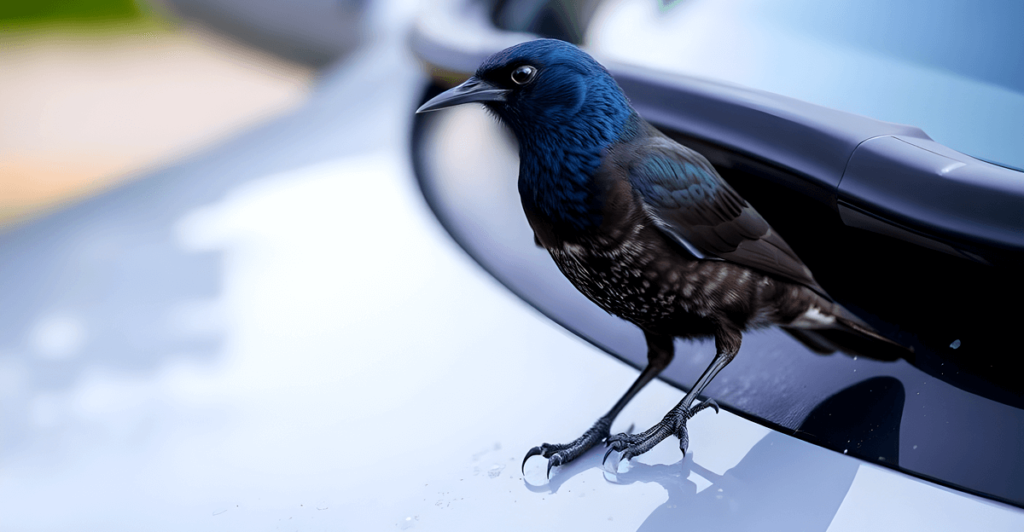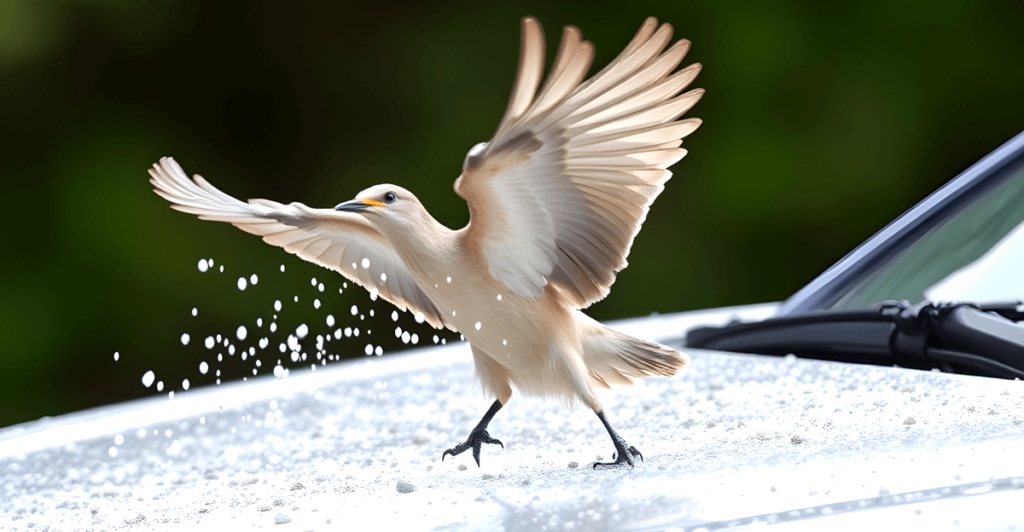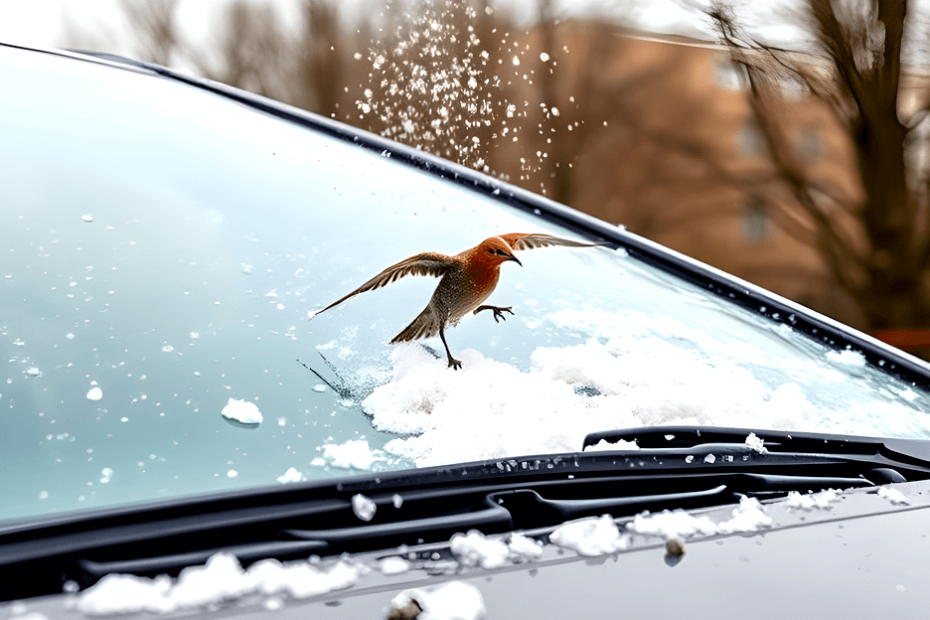Introduction
As a car enthusiast and someone who has battled with the persistent problem of bird droppings on my vehicles for years, I’ve learned a thing or two about keeping our feathered friends from using my car as their personal toilet. In this comprehensive guide, I’ll share my first-hand experiences, tried-and-tested methods, and expert insights on how to prevent birds from pooping on your car. Let’s dive in!
How to Prevent Birds from Pooping on My Car?
Before we get into the nitty-gritty of prevention, it’s crucial to understand why birds seem to have a particular affinity for relieving themselves on our precious vehicles. Through my observations and research, I’ve discovered several factors that contribute to this annoying behavior.
The Allure of Shiny Surfaces
Birds, especially larger species like seagulls and pigeons, are often attracted to reflective surfaces. Your car’s gleaming paintwork or polished windows can resemble water to a bird flying overhead. I’ve noticed this, particularly with my black sedan, which seems to be a magnet for avian attention.
Convenient Perches
Many birds prefer to perch on elevated surfaces, and unfortunately, side mirrors, roof racks, and antennae provide perfect roosting spots. I once made the mistake of parking under a tree branch that overhung my driveway, only to find my car covered in droppings the next morning.
Territorial Marking
Some birds may view your car as an intruder in their territory, especially if you regularly park in the same spot. I’ve experienced this firsthand with a particularly aggressive mockingbird that seemed to target my car specifically when I parked near its nest.
The Impact of Bird Droppings on Your Car
As someone who takes pride in maintaining my vehicles, I can attest to the frustration of finding bird droppings on a freshly washed car. However, the issues go beyond mere aesthetics.
Paint Damage
Bird droppings are highly acidic, with a pH level that can range from 3 to 4.5. This acidity can eat through your car’s clear coat and even the paint if left for too long. I learned this the hard way when a large dropping on my hood left a permanent etching in the paint after I neglected to clean it promptly.
Health Concerns
Bird droppings can carry various pathogens, including bacteria, fungi, and parasites. While the risk of disease transmission to humans is relatively low, it’s still a concern, especially if you have children who might come into contact with the droppings.
Preventive Measures: My Go-To Strategies
Over the years, I’ve tried numerous methods to keep birds from targeting my cars. Here are some of the most effective strategies I’ve employed:
1. Car Covers: A Physical Barrier
One of the simplest and most effective methods I’ve found is using a car cover. Here’s a breakdown of the types I’ve tried:
| Type of Cover | Pros | Cons |
|---|---|---|
| Universal Fit | Affordable, Easy to find | May not fit perfectly, Can be cumbersome to put on/remove |
| Custom Fit | Excellent protection, Snug fit | More expensive, May need to be replaced if you change cars |
| Indoor | Lightweight, Dust protection | Not suitable for outdoor use |
| Outdoor | Weather-resistant, UV protection | Heavier, More expensive |
Pro Tip: I’ve found that investing in a high-quality, custom-fit outdoor cover provides the best protection and is worth the extra cost in the long run.

2. Visual Deterrents: Tricking the Birds
Birds are naturally wary of predators and unfamiliar objects. I’ve had success with the following visual deterrents:
- Reflective Objects: Hanging old CDs or reflective tape near your parking spot can deter birds. I strung a line of CDs across my carport, which significantly reduced bird activity.
- Predator Decoys: I placed a plastic owl on my fence, moving it periodically to maintain its effectiveness. This worked well for smaller birds but was less effective against pigeons.
- Holographic Tape: Strips of holographic tape fluttering in the breeze create an unsettling visual effect for birds. I’ve used this on my balcony railing with good results.
3. Sound-Based Deterrents: A High-Tech Approach
While I was initially skeptical, I’ve found some success with sound-based deterrents:
- Ultrasonic Devices: These produce high-frequency noises that humans cannot hear but that are disagreeable to birds. I installed one in my driveway, which seemed to reduce bird activity, although it wasn’t 100% effective.
- Bird Distress Calls: Some devices play recordings of bird distress calls. I tried this method but found it less effective and potentially annoying to neighbors.
4. Physical Barriers: Creating No-Landing Zones
For areas where birds frequently perch, physical barriers can be highly effective:
- Spikes and Wires: I installed bird spikes on the fence near my parking spot, which prevented birds from landing and reduced droppings on my car.
- Netting: For my carport, I set up bird netting along the open sides, creating a barrier that birds couldn’t penetrate.
5. Smell-Based Deterrents: A Natural Approach
Birds have a strong sense of smell, which can be used to our advantage:
- Essential Oils: I’ve experimented with spraying a mixture of peppermint oil and water around my parking area. While not foolproof, it seemed to reduce bird activity.
- Commercial Repellents: There are several bird repellent sprays on the market. I’ve had mixed results with these, but some car owners swear by them.
Modifying the Environment: Creating a Bird-Unfriendly Zone
Sometimes, the best defense is to make your parking area less attractive to birds in the first place. Here are some strategies I’ve implemented:
Removing Attractants
I took a critical look at my property and removed anything that might be attracting birds:
- Secured trash cans with tight-fitting lids
- Cleaned up fallen fruit from nearby trees
- Covered my compost bin
Trimming Nearby Trees and Bushes
I hired a professional to trim the trees near my driveway, removing low-hanging branches that birds were using as perches. This made a noticeable difference in the number of droppings on my car.
Relocating Bird Feeders and Baths
While I enjoy watching birds, I realized my bird feeder was part of the problem. I moved it to the far end of my backyard, away from where I park my cars. This simple change dramatically reduced the number of birds near my vehicles.
Parking Strategies: Location, Location, Location
Where and how you park can make a big difference in preventing bird droppings. Here are some strategies I’ve found effective:
Choosing the Right Spot
Whenever possible, I avoid parking:
- Under trees
- Near light posts or power lines
- In areas with large bird populations (like near water or in city centers)
Using Structures and Natural Cover
I’ve found that parking close to buildings or under overhangs can provide some protection. At home, I installed a carport, which has been incredibly effective at keeping birds away from my vehicle.

Rotating Parking Positions
When parking in public areas, I try to vary my parking spot. I’ve noticed that birds often target cars that are always in the same place, possibly viewing them as part of their territory.
Quick-Response Cleaning Techniques
Despite our best efforts, sometimes birds will still manage to leave their mark. In these cases, quick action is crucial. Here’s my tried-and-true method for cleaning bird droppings:
- Soak the droppings: I use a spray bottle filled with water and a small amount of car shampoo to thoroughly wet the droppings. This helps prevent scratching when removing them.
- Lift, don’t scrub: Using a soft, damp microfiber cloth, I gently lift the droppings off the surface. Scrubbing can grind the droppings into the paint, causing damage.
- Clean the area: Once the bulk of the droppings are removed, I clean the area thoroughly with car shampoo and water.
- Dry and inspect: After cleaning, I dry the area with a clean microfiber towel and inspect for any remaining residue or damage.
- Apply protection: If the area looks clean and undamaged, I apply a quick detailer spray for added protection.
Pro Tip: I always keep a small “bird dropping emergency kit” in my car, consisting of a spray bottle with water, a few microfiber cloths, and a quick detailer spray.
Long-Term Protection for Your Vehicle
While prevention is key, providing long-term protection for your car’s finish can make cleaning easier and minimize damage from any droppings that do occur. Here are some methods I’ve found effective:
Paint Sealants and Ceramic Coatings
I’ve had great success with ceramic coatings. While they’re more expensive than traditional wax, they provide superior protection and make cleaning much easier. I had a professional apply a ceramic coating to my car, and it’s been a game-changer in terms of maintenance and protection.
Regular Waxing and Detailing
For those not ready to invest in ceramic coating, regular waxing is crucial. I wax my cars every three months, which not only protects the paint but also makes it easier to clean off any bird droppings.
Protective Films and Wraps
For ultimate protection, clear bra or paint protection film can be applied to vulnerable areas of your car. I’ve had this done on the hood and front fenders of my sports car, which are most likely to be hit by bird droppings while driving.
DIY Solutions: Getting Creative
Sometimes, the best solutions are the ones you create yourself. Here are some DIY methods I’ve experimented with:
Homemade Deterrent Sprays
I’ve had some success with a homemade spray consisting of:
- 1 part white vinegar
- 3 parts water
- A few drops of dish soap
I spray this mixture around my parking area every few days. While not foolproof, it seems to help deter birds.
Creating Your Own Visual Deterrents
Get creative with materials you have at home. I’ve made wind chimes out of old keys and bottle caps, which create movement and noise that birds find unsettling.
Repurposing Household Items
Old CDs, pinwheels, or even strips of aluminum foil can be effective bird deterrents. I’ve hung these items from trees near my parking spot with some success.
Professional Services and Products
For those willing to invest more in bird prevention, there are professional services and high-end products available:
Bird Control Experts
I once hired a bird control expert to assess my property and provide customized solutions. While expensive, their expertise was valuable in addressing specific issues I was facing.
High-End Electronic Deterrent Systems
There are sophisticated electronic systems that use a combination of sound, light, and even laser beams to deter birds. While I haven’t personally used these due to their cost, I’ve seen them in action at commercial properties with impressive results.
Specialty Car Care Products
Some car care brands offer products specifically designed to protect against bird droppings. I’ve tried a few of these, including special waxes and quick detailer sprays, with varying degrees of success.
Legal and Ethical Considerations
It’s important to remember that while we want to protect our cars, we also need to consider the welfare of birds and comply with local regulations:
Local Regulations
Before implementing any bird control measures, especially more aggressive ones like spikes or netting, check your local laws. Some methods may be restricted, particularly for protected species.
Humane Approaches
Always prioritize humane methods that deter birds without causing harm. I’ve found that most of the non-invasive methods described earlier are both effective and ethical.

Balancing Protection with Conservation
Remember that birds play important roles in our ecosystems. While protecting our cars is important, it shouldn’t come at the expense of harming bird populations. I’ve found that a combination of deterrents and protective measures for my car strikes a good balance.
Frequently Asked Questions
Throughout my journey in battling bird droppings, I’ve encountered many questions from fellow car enthusiasts. Here are some of the most common ones:
Q: How often should I clean bird droppings off my car?
A: As soon as possible! I make it a habit to check my car daily and clean any droppings immediately to prevent damage.
Q: Can bird droppings really damage my car’s paint?
A: Absolutely. I’ve seen firsthand how quickly the acid in bird droppings can etch paint. Always clean them off promptly.
Q: Are there any bird-proof car paints available?
A: While no paint is completely “bird-proof,” modern ceramic coatings provide excellent protection. I’ve noticed a significant difference since having my car ceramic coated.
Q: What should I do if a bird has nested near my regular parking spot?
A: This is tricky. Legally, you often can’t remove active nests. In such cases, I’ve found temporary covered parking or using a car cover to be the best solutions until the nesting season is over.
Q: How can I protect my car from birds when parking in public areas?
A: I always carry a portable car cover for long-term parking in public areas. For short stops, parking away from trees, light posts, and obvious bird hangouts can help.
Conclusion: My Personal Takeaways
After years of battling bird droppings on my cars, I’ve learned that no single method is 100% effective. The key is to combine multiple strategies:
- Use physical barriers like car covers when possible.
- Employ a variety of deterrents, rotating them periodically to prevent birds from getting used to them.
- Be mindful of where you park, avoiding obvious bird hotspots.
- If there are any droppings, clean them up right away.
- Invest in long-term protection for your car’s finish.
Remember, protecting your car from bird droppings is an ongoing process. Stay vigilant, be creative, and don’t be afraid to try new methods. With persistence and the right combination of techniques, you can significantly reduce the impact of bird droppings on your vehicle.
